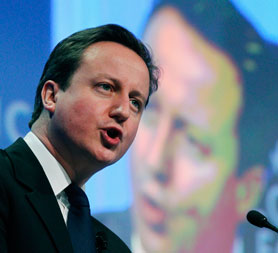David Cameron ‘uneasy’ over courts ruling on privacy
Prime Minister David Cameron questions whether judges should be effectively creating a privacy law without the involvement of parliament, by granting celebrities gagging orders against the press.
Speaking in Luton today Mr Cameron said:
“What’s happening here is that the judges are using the European Convention on Human rights to deliver a sort of privacy law without Parliament saying so. I think that we do need to have a proper sit back and think: is this right, is this the right thing to happen?
“The judges are creating a sort of privacy law whereas what ought to happen in a parliamentary democracy is Parliament, which you elect and put there, should decide how much protection do we want for individuals and how much freedom of the press and the rest of it. So I am a little uneasy about what is happening.”
He added: “It might be odd to hear it, but I don’t really have the answer to this one, I need to do some more thinking about it. It is an odd situation if the judges are making the law rather than Parliament.”
At a High Court hearing on Wednesday a married footballer who reportedly had an affair with Big Brother contestant Imogen Thomas was granted the right to remain anonymous.
Its thought that some 20-30 are in place to prevent publication of the details of the lives of the rich and famous, but due to their secret nature the exact figure is hard to pin down.

Freedom of speech campaigners have been alarmed by the increasing willingness of judges to restrict the right to freedom of expression under Article 10 of the European Convention of Human Rights.
Conservative MP John Whittingdale, the chairman of the Culture, Media and Sport Select Committee told Channel 4 News: “There is concern in Parliament undoubtedly that we have a growing number of cases of privacy, when Parliament in the past has explicitly siad that it doesn’t want a privacy law.”
“When we passed the Human Rights Act we knew this would lead to privacy cases .. but Parliament at the time actually included in the Human Rights Act a provision which said the balance should be tilted in favour of freedom of expression and my concern is that doesn’t seem to be working.”
In a separate High Court hearing, on Wednesday Mr Justice Eady, issued what is thought to be the first ‘contra mundum’ order which permanently blocks publication of material relating to an individual’s private life. Previously such draconian orders have been limited to a few notorious criminal cases, such as the contra mundum injunction in place banning anyone from revealing the new identities of Jon Venables and Robert Thomson, the killers of James Bulger.
In 2008 the same judge, Mr Justice Eady, ruled that the News of the World newspaper should pay World motorsport boss Max Mosley £60,000 in damages over claims that he took part in an orgy which had Nazi overtones. In his ruling, Mr Justice Eady rejected any suggestion that Mr Mosley had intended to mock the victims of the Holocaust, and said that he could expect privacy for consensual sexual activities.
He added “it is perhaps worth adding that there is nothing ‘landmark’ about this decision. It is simply the application to rather unusual facts of recently developed but established principles.”